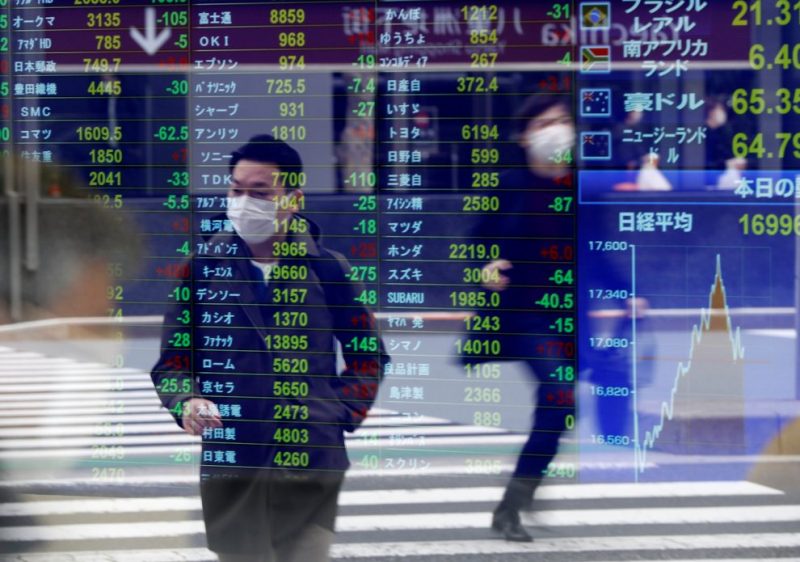(ATF) Hong Kong: Markets reversed their losses as investors focused on earnings after a surprise turnaround by Tesla but risk sentiment remains fragile amid growing Sino-US tensions driving many to the safety of gold and US Treasuries.
Earlier in the day, Tesla reported a surprise second-quarter profit. It reported a profit of $104 million in the quarter ending June 30 compared with a loss of $408 million in the same period one year ago.
South Korean markets underperformed after the economy contracted by more than expected in the second quarter, taking Asia’s fourth largest economy into a technical recession.
The Kospi index fell 0.56% and the Nikkei 225 fell 0.58% after Japan recorded 366 new coronavirus cases, a new daily record fuelling fears of a second round of infections.
China’s CSI 300 benchmark recovered its losses and ended the day marginally lower and Hong Kong’s Hang Seng index wiped out its losses closing 0.82% higher.
But gold prices rose 0.6% to $1,882 per ounce and 10-year US Treasuries yields fell one basis point to 0.59%, as tensions between the US and China showed no signs of cooling.
Beijing said it will make a proper and necessary response to Washington’s closure of the Consulate General in Houston unless it “immediately revokes the wrong decision”.
State media outlet Global Times said China could take countermeasures such as shutting down the US Consulate General in Hong Kong.
The United States ordered China to close its consulate in Houston, saying it was “to protect American intellectual property and Americans’ private information.”
Korean contraction
Meanwhile, the Bank of Korea reported that the South Korean economy contracted 3.3% in the second quarter. This was worse than the market consensus of a -2.4% contraction and investors are worried about a lack of policy response.
“The Bank of Korea has highlighted fairly clearly that it is done with easing, amid rising concern once more over house prices,” said Robert Carnell ING Bank’s Regional Head of Research for the Asia-Pacific.
“And the government has also put in place a lot of fiscal stimulus – three supplementary budgets so far this year, so there probably won’t be any more from them for a while either.”
This is in contrast to China, Asia’s biggest economy, which has plenty of options to revive growth after it reported a better than expected second-quarter expansion.
UBS economists on Thursday upgraded China’s 2020 GDP growth forecast from 1.5% previously to 2.5% after the outperformance.
“We expect macro policies to remain supportive in H2 as economic activities have not fully returned to pre-Covid-19 levels even after the strong Q2 rebound and job market pressure persists and growth uncertainty lingers,” they said in a note.
UBS expects fiscal support to continue via infrastructure spending and monetary support via enhanced credit supply.
Overnight, Wall Street clung on to gains on optimism about another stimulus package. The Dow Jones Industrial Average added 0.62%, the S&P 500 climbed 0.57% and the Nasdaq Composite advanced 0.24%.
Credit markets have rallied during the day with the Asia IG index two basis point tighter at 73/74 bps and sovereign CDS moving in by 2-5 basis points. Manila Water, Huzhou City, and Mirae Asset Daewoo are in the market with bond offerings as investors seek yield.
Also on Asia Times Financial
Trouble in the World’s Factory
China’s new data security law extends sovereignty to cyberspace
Trump delisting threat benefiting Hong Kong
Tesla reports surprise profit despite Covid-19 upheaval
Foreign Exchange:.
Asia Stocks
# Japan’s Nikkei 225 slid 0.58%
# Australia’s S&P ASX 200 added 0.32%
# Hong Kong’s Hang Seng index advanced 0.82%
# China’s CSI300 ended flat
# The MSCI Asia Pacific index edged up 0.13%.
Stock of the day
Future Retail bonds dropped by 8 points and its shares tumbled by 5% after the company said it had missed a coupon payment on its $500 million 5.6% bonds due 2025. But the company said it will make the payment within the 30-day grace period.
























